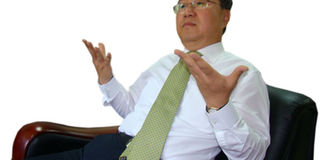Honesty is the sure way to fight graft, says S. Korea’s’ Jong-Dae

Amb Park Jong-Dae also says the government should be selective on donor aid. PHOTO BY ANDREW BAGALA
What you need to know:
Transformation. About 50 years ago, South Korea was a war-stricken country. It suffered hunger, diseases and poverty. However, all that is now history as the Asian country has since managed to turn her fortune around. Sunday Monitor’s ISMAIL MUSA LADU and ANDREW BAGALA interviewed the South Korean Ambassador to Uganda, His Excellency Park Jong-Dae, on a wide range of issues, including how his country has transformed into one of the Asian tigers. Excerpts:
1. How did you turn your country around from poverty-stricken and war-ravaged nation to where you are now, yet you don’t have significant natural resources?
It all started by change of attitude and mindset. We realised that we had to do it on our own and not rely on foreign donations. We had to resort to our collective strength—the village movement, an equivalent of bulungi bwansi—where community engage in nation building through voluntary and collective participation.
2. Does that explain why you are technologically advanced like other developed countries?
What happened is that we never discarded our traditional (old) technology. We simply developed them. And over time, we kept upgrading them to a point that they are now very efficient. Uganda can follow that path too. You don’t have to start with a grand technology but make use of what you have and improve it with time.
3. To what extent did the foreign assistance (donor aid) help your country develop?
Aid dependency was spoiling our people. Many times, we disagreed with the donor partners and chose not to follow their advise. We took a decision to become export-oriented rather than depending on imports. We were advised then that this route is immature for us but we rejected that suggestion—and it has paid off. We had problems with World Bank over funding our mega projects because we didn’t want to be too dependent. And we also didn’t want to take all that the donors asked of us. If you do that then you will not have direction.
4. What is your take on the economic model that Uganda has adopted?
I think liberal economy is good for business people and not so much for ordinary citizens.
5. Uganda is doing badly in terms of managing corruption. How are you dealing with the vice in your country?
Sincerity and honesty is the only sure way to stamp out corruption. We teach morals, build values and instill discipline throughout our systems. It is obvious in South Korea to be polite and honour elders. And this is done from the young age. And later in life, it is repeated in our secondary schools as well. There is also a national ethic study that all civil servants or public officials must undergo before working in public office. We also had severe provincial discrimination but we got rid of that through such practices I have enumerated.
6. Uganda has discovered oil and it intends to refine instead of selling it in raw form. Is that a good idea and is the resource dependable enough to turn the fortune of a country like Uganda?
It is crucial that Uganda builds a refinery. I know some people will say building a refinery is not a good idea, but we developed because we refused to listen to advise that could ultimately reduce us to beggars rather than partners. However, Uganda must guard against dependency.
Agriculture is an important sector and it must be developed. Especially, the agro-processing side of it. This is important because when the oil resource runs out, life will have to continue uninterrupted. But that can only be possible if Uganda harnesses her comparative advantage in agriculture.
7. What can Uganda learn from South Korea’s experience?
First, it must export more than it imports. And it should have industries in Kampala relocated to rural areas because the city is already congested. This will not just decongest Kampala but also provide employment to the rural folks, ultimately boosting their incomes.
This, therefore, means people in the city will not be working to support their rural families/relatives as it seems to be the case because they will also be productive—tapping from the rural industries.
You (Uganda) must also be responsible and benchmark with others but do not take everything except the most necessary things. We are also willing to share our experiences, if it can help Uganda and her people. We can transfer some of our appropriate technology because we believe that we are here not to take away but strengthen our relationships. This is because a prosperous Uganda is good for all of us.
8. How exactly will Uganda benefit from South Korea and in turn how would you want to benefit from Uganda?
As you may know, we are late comers (in Uganda and several parts of Africa). But we would want to have Uganda’s agricultural products in our shelves. For example, as we speak, Uganda has one of the best coffee, but South Koreans do not know that---all they know is Kenyan and Ethiopian coffee yet Uganda has fantastic coffee. Generally, Uganda has a lot to export to South Korea. For example, we need a lot of ginger and tea—and Uganda could grab that opportunity and become our main suppliers—all they need to do is add value to them. Our aim is to strengthen our relationship.




